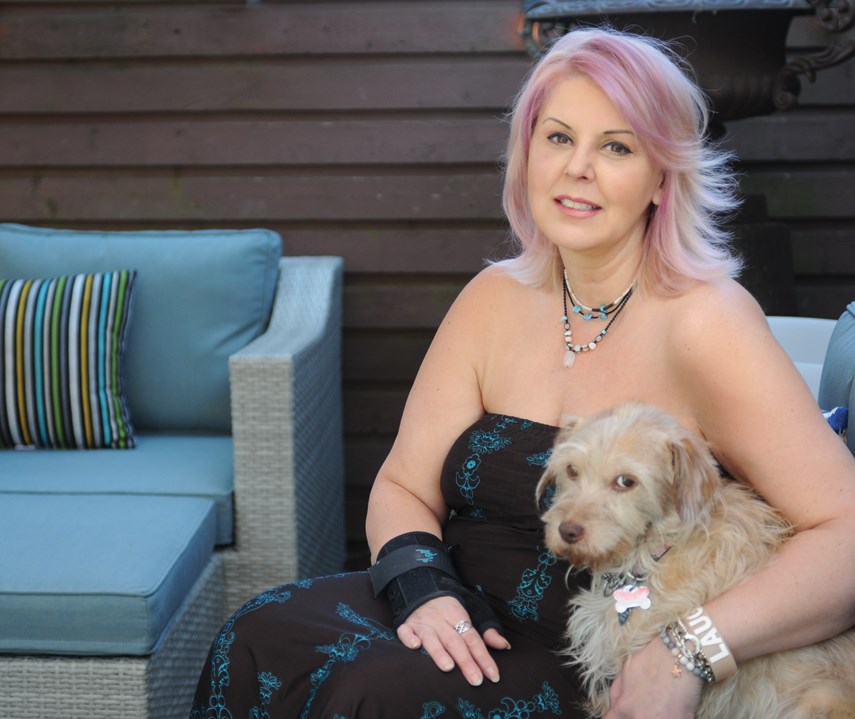A North Vancouver mom says people need to start taking Dr. Bonnie Henry’s “be kind, be calm” messages to heart after she says responses she received from people living in her apartment building were anything but when her kids recently contracted COVID.
Shelley Brookes, who lives in a building in Central Lonsdale, said both of her kids, 12 and 17, tested positive for COVID-19 last month and the family immediately went into isolation.
But instead of treating her with compassion, Brookes said some of her neighbours reacted with fear and gossip, even phoning health authorities to report on her activities.
Brookes said she’s still not entirely sure how her kids contracted COVID. In March, her 12-year-old son was identified as a close contact of a friend at school and told to watch for symptoms. Most likely, however, is that both her kids contracted the illness through a visit to her ex in his apartment. Unknown to Brookes at the time, a friend of her ex’s from another community was also visiting that day, and her boys spent several hours in the apartment with that person. Within a couple of days, that friend developed COVID symptoms.
Brookes said as soon as she got the news, her family immediately went to be tested for the virus. Her own test came back negative, but her boys weren’t so lucky – both of them tested positive for the virus.
Luckily their symptoms were mild, she said. Her younger son was mostly symptom-free while her 17-year-old had mild flu-like symptoms of a fever and headache for a few days.
Immediately the family of three went into self-isolation and Brookes said she received advice from Vancouver Coastal Health about what she could and couldn’t do. One thing she was allowed to do was walk the family dog, she said – as long as she stayed away from others and wore her protective equipment.
Brookes, who lives on the ground floor of her building, said she followed that advice – ducking out a side door with her pooch, wearing a mask and gloves.
Soon, however, she got a phone call from a member of her building’s strata council, saying a neighbour had voiced concern after seeing her outside.
Brookes said she still doesn’t know how people in her building got word of her kids’ COVID infections.
Brookes assured the council member that dog walking following strict protocols was still allowed.
But soon she faced another challenge – she needed to do laundry. Again, health officials told her it was OK – as long as she donned a mask and gloves and warned other tenants on her floor so they wouldn’t enter the laundry room while she was there.
Brookes said she had to knock on one neighbour’s door a couple of times to co-ordinate their movements. During one of those knocks, Brookes said she could hear the woman on the phone, reporting the laundry scenario to someone. “She was basically throwing me under the bus,” said Brookes – who subsequently let her neighbour know she didn’t appreciate the interference.
Brookes said the experience made her appreciate why such medical information is kept private: “Because it starts freaking people out.”
Brookes said she even received Facebook messages from one of the people in the building, saying, “how could I be putting everybody's health at risk and defying the health regulations?”
But Brookes said she was always very careful, wearing a mask and wiping all surfaces her kids could have touched.
Her measures were obviously successful, she adds – because she did not contract the virus, despite taking a second test just to make sure.
Some neighbours even expressed surprise when they saw her or her kids long after their 14-day period of isolation was over, she added.
Brookes said she understands why people probably overreacted. “Everybody is in so much fear right now.”
She admits she’s also received some blowback from people who’ve pointed out her ex didn’t follow the rules about only having household members together in indoor settings.
“And I said, ‘Obviously he didn’t. You can’t control everybody.’”
Most of those present in the apartment that day were lucky to only have mild COVID-19 symptoms, she said. But one adult did end up briefly in hospital after having difficulty breathing.
It’s a good reminder of how easily the virus can spread, she said. “You just kind of assume, oh I’m with this person and everything’s good, right? You have no idea.”
According to a recent report by the National Collaborating Centre for Environmental Health, which reviewed COVID studies from around the world, the number of COVID cases linked to transmission within multi-unit apartment buildings was extremely small. Limiting the number of people in common spaces like elevators and laundry rooms, and ensuring masks are required in those areas appeared adequate to controlling risk, according to that review.



